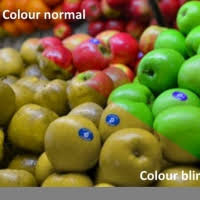Colour Blindness
- hetal unadkat

- Mar 9, 2019
- 1 min read
Updated: Mar 18, 2019
What is colour blindness?
Colour blindness is also known as colour vision deficiency ability to see colour or deficiencies in colour. Simple task such as selecting ripe fruit, choosing clothing and reading traffic light can be more challenging.
Colour blindness may be described as total or partial. Total colour blindness is much less common than partial colour blindness.
The most frequent forms of human colour blindness result from problems with either the middle (green) or long(red) wavelength sensitive cone systems, and make it hard to discriminate reds, yellows, and greens from one another.
What are the types of colourblindness?
There are major two types of colour blindness;difficulty distinguishing between red and green, and difficulty distinguishing between blue and yellow.
Protanopia and deuteranopia are commonly inherited forms of red-g reen colour blindness which affect a substantial portion of the human population.
Immunofluorescent imaging is a way to determine red-green colour coding. Conventional colour is difficult for individuals with red-green colour blindness to discriminate.
#colourblindness#Life#Cure



Commentaires